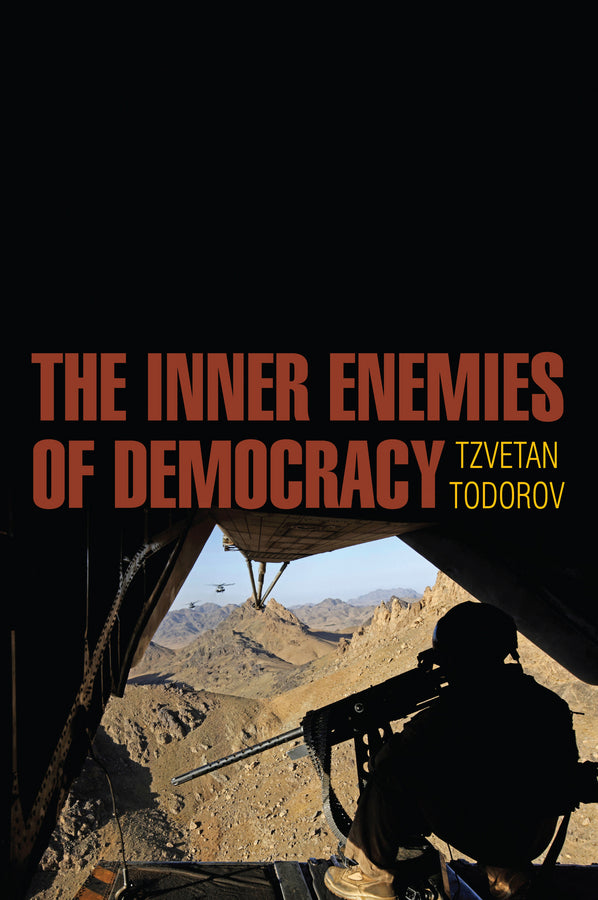Description
Discover the illuminating insights of 'The Inner Enemies of Democracy' by Tzvetan Todorov, a thought-provoking exploration that challenges our understanding of modern democratic systems. This groundbreaking book, published by John Wiley & Sons in 2014, delves into the intricate dynamics at play within democracies and posits that the greatest threats to democratic ideals are not external but originate from within our own societies.
In this compelling analysis, Todorov argues that while many perceive various movements such as Islamic fundamentalism and international terrorism as primary adversaries, the real enemies lie in the distortion of fundamental democratic values. He highlights how the pursuit of freedom can, paradoxically, lead to new forms of tyranny under the guise of humanitarian interventions. The narrative draws on historical precedents, philosophical debates, and Todorov’s personal experiences under totalitarianism to underscore the pressing need for a reconsideration of what true democracy entails.
With 200 pages of critical thought, this book is a must-read for anyone interested in political theory, democratic principles, and the moral complexities of modern governance. The exploration of themes such as human rights, moral dilemmas, and societal responsibilities offers a unique perspective that is increasingly relevant today.
Note: Shipping for this item is free. Please allow up to 6 weeks for delivery. Once your order is placed, it cannot be cancelled. Condition: BRAND NEW. ISBN: 9780745685748. Year: 2014. Publisher: John Wiley & Sons (UK). Pages: 200.
Note: Shipping for this item is free. Please allow up to 6 weeks for delivery. Once your order is placed, it cannot be cancelled.
Condition: BRAND NEW
ISBN: 9780745685748
Year: 2014
Publisher: John Wiley & Sons (UK)
Pages: 200
Description:
The political history of the twentieth century can be viewed as
the history of democracy?s struggle against its external
enemies: fascism and communism. This struggle ended with the fall
of the Berlin Wall and the collapse of the Soviet regime. Some
people think that democracy now faces new enemies: Islamic
fundamentalism, religious extremism and international
terrorism and that this is the struggle that will define our
times. Todorov disagrees: the biggest threat to democracy today is
democracy itself. Its enemies are within: what the ancient Greeks
called 'hubris'.
Todorov argues that certain democratic values have been
distorted and pushed to an extreme that serves the interests of
dominant states and powerful individuals. In the name of
?democracy? and ?human rights?, the United
States and some European countries have embarked on a crusade to
enlighten some foreign populations through the use of force. Yet
this mission to ?help? others has led to Abu Ghraib and
Guantanamo, to large-scale destruction and loss of life and to a
moral crisis of growing proportions. The defence of freedom, if
unlimited, can lead to the tyranny of individuals.
Drawing on recent history as well as his own experience of
growing up in a totalitarian regime, Todorov returns to examples
borrowed from the Western canon: from a dispute between Augustine
and Pelagius to the fierce debates among Enlightenment
thinkers to explore the origin of these perversions of
democracy. He argues compellingly that the real democratic ideal is
to be found in the delicate, ever-changing balance between
competing principles, popular sovereignty, freedom and progr
In this compelling analysis, Todorov argues that while many perceive various movements such as Islamic fundamentalism and international terrorism as primary adversaries, the real enemies lie in the distortion of fundamental democratic values. He highlights how the pursuit of freedom can, paradoxically, lead to new forms of tyranny under the guise of humanitarian interventions. The narrative draws on historical precedents, philosophical debates, and Todorov’s personal experiences under totalitarianism to underscore the pressing need for a reconsideration of what true democracy entails.
With 200 pages of critical thought, this book is a must-read for anyone interested in political theory, democratic principles, and the moral complexities of modern governance. The exploration of themes such as human rights, moral dilemmas, and societal responsibilities offers a unique perspective that is increasingly relevant today.
Note: Shipping for this item is free. Please allow up to 6 weeks for delivery. Once your order is placed, it cannot be cancelled. Condition: BRAND NEW. ISBN: 9780745685748. Year: 2014. Publisher: John Wiley & Sons (UK). Pages: 200.
Note: Shipping for this item is free. Please allow up to 6 weeks for delivery. Once your order is placed, it cannot be cancelled.
Condition: BRAND NEW
ISBN: 9780745685748
Year: 2014
Publisher: John Wiley & Sons (UK)
Pages: 200
Description:
The political history of the twentieth century can be viewed as
the history of democracy?s struggle against its external
enemies: fascism and communism. This struggle ended with the fall
of the Berlin Wall and the collapse of the Soviet regime. Some
people think that democracy now faces new enemies: Islamic
fundamentalism, religious extremism and international
terrorism and that this is the struggle that will define our
times. Todorov disagrees: the biggest threat to democracy today is
democracy itself. Its enemies are within: what the ancient Greeks
called 'hubris'.
Todorov argues that certain democratic values have been
distorted and pushed to an extreme that serves the interests of
dominant states and powerful individuals. In the name of
?democracy? and ?human rights?, the United
States and some European countries have embarked on a crusade to
enlighten some foreign populations through the use of force. Yet
this mission to ?help? others has led to Abu Ghraib and
Guantanamo, to large-scale destruction and loss of life and to a
moral crisis of growing proportions. The defence of freedom, if
unlimited, can lead to the tyranny of individuals.
Drawing on recent history as well as his own experience of
growing up in a totalitarian regime, Todorov returns to examples
borrowed from the Western canon: from a dispute between Augustine
and Pelagius to the fierce debates among Enlightenment
thinkers to explore the origin of these perversions of
democracy. He argues compellingly that the real democratic ideal is
to be found in the delicate, ever-changing balance between
competing principles, popular sovereignty, freedom and progr

